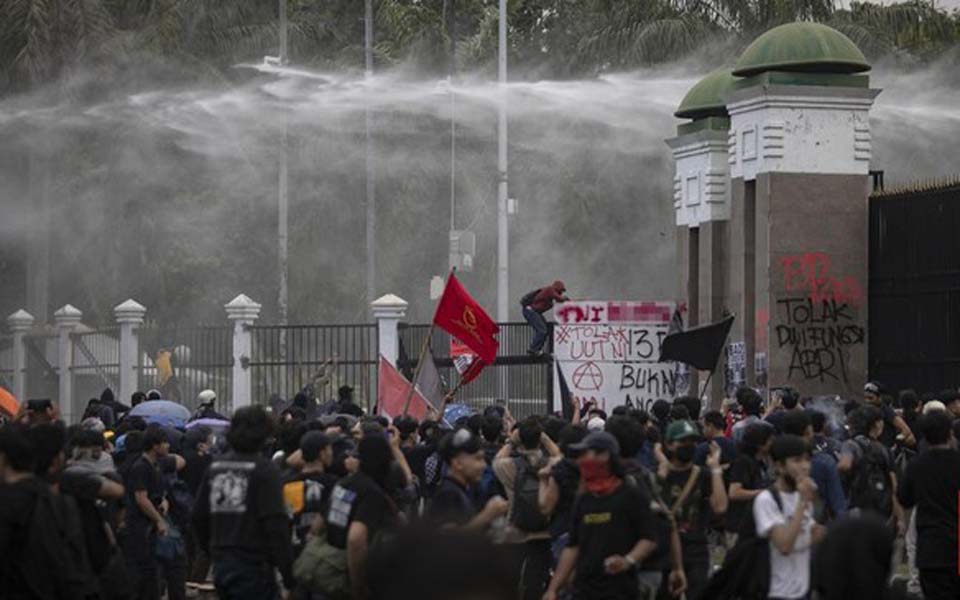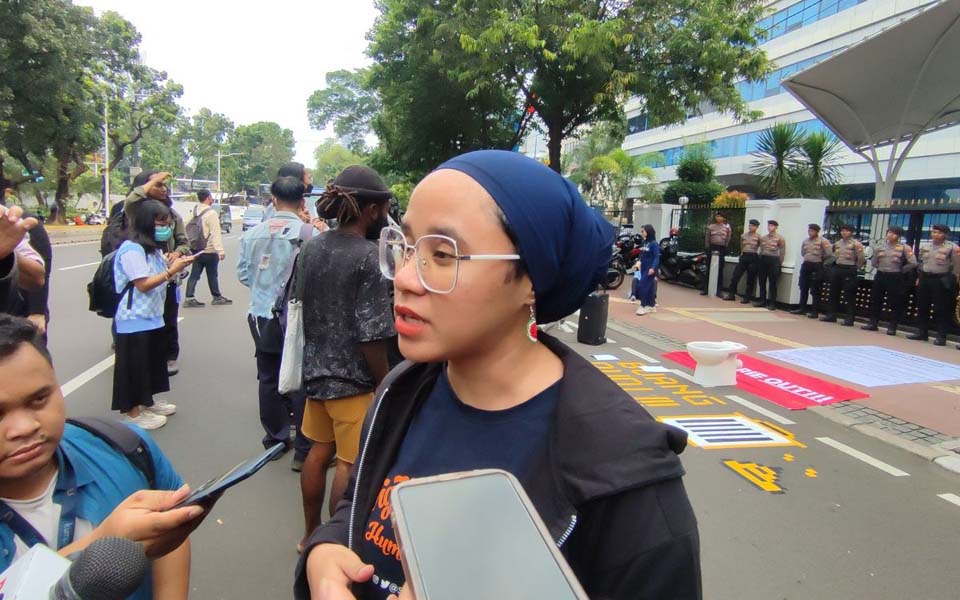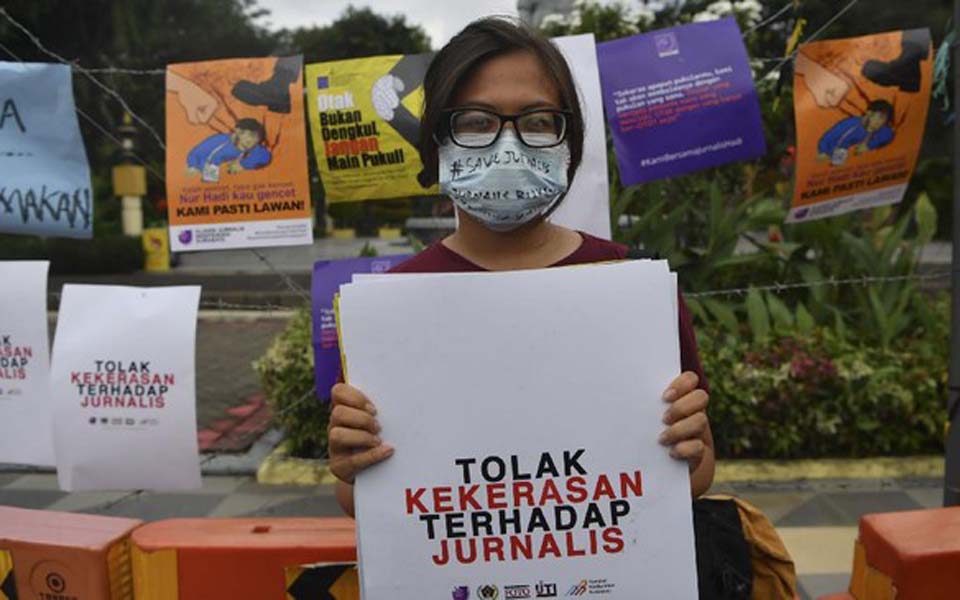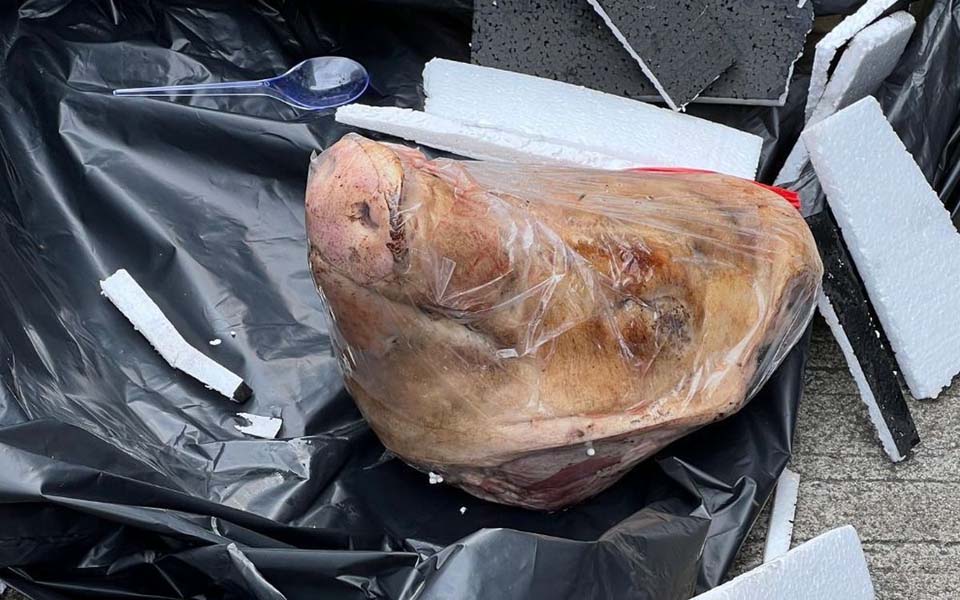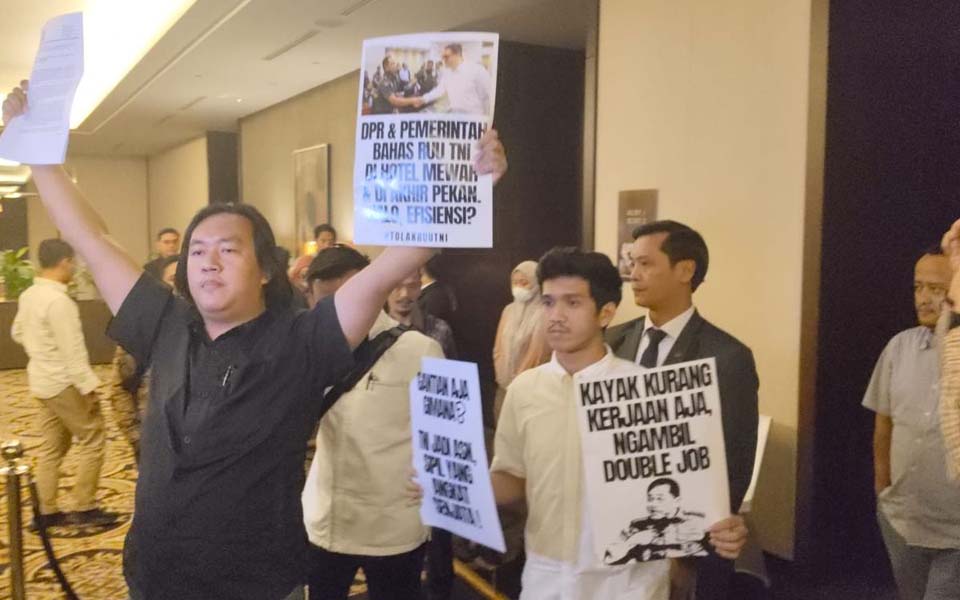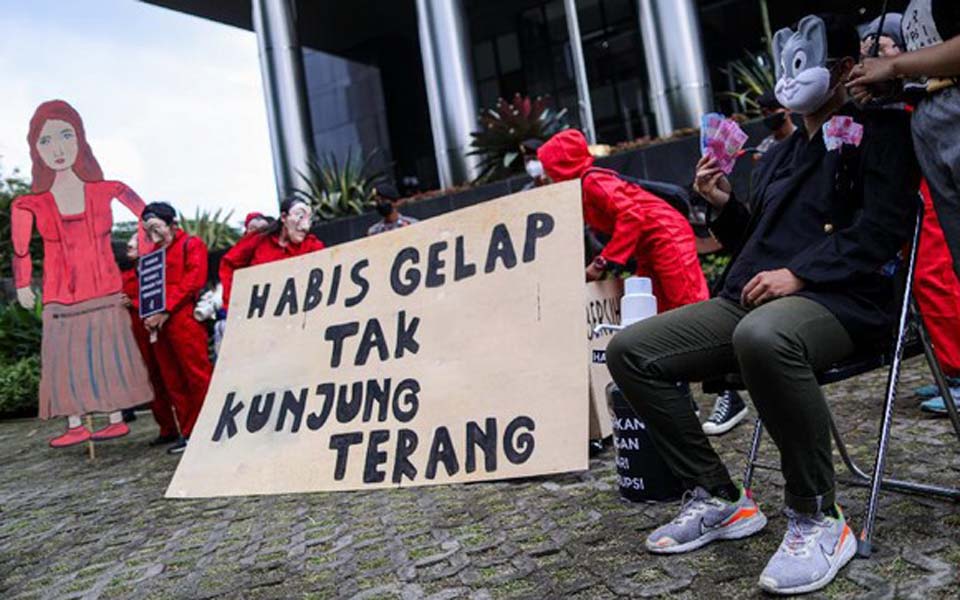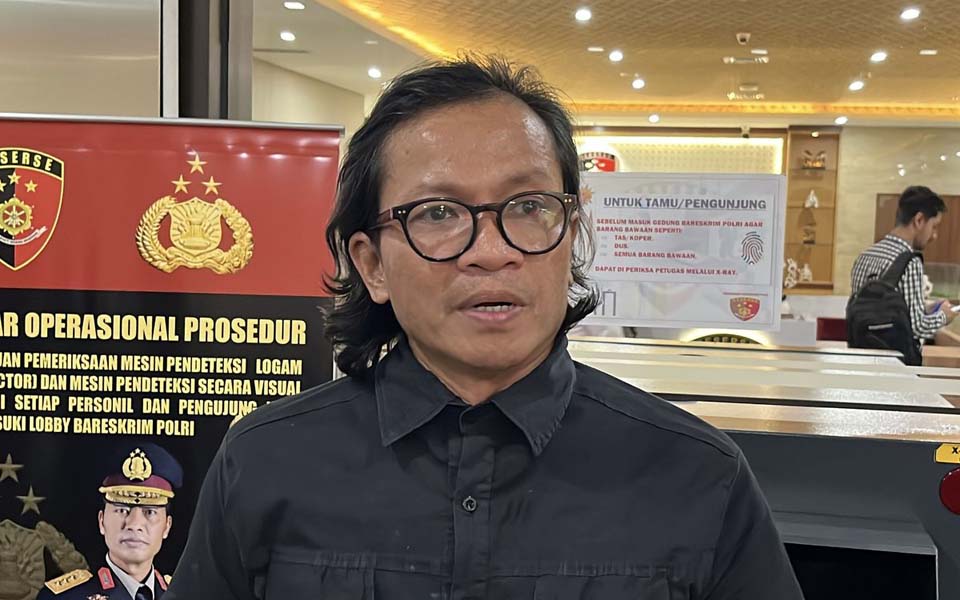For more than a month, Iqbal Siregar (36), an activist from the Islamic Youth Movement (Gerakan Pemuda Islam, GPI), has been incarcerated in the holding cells of the Metro Jaya local police. He spends his days in a cell measuring 5 x 6 metres with criminal suspects. Iqbal has absolutely no relationship with the world of crime. He was arrested because of his political activities, demonstrating against the Megawati Sukarnoputri government’s policy of increasing the price of fuel last January. He was arrested on charges of insulting the president because he was found holding a picture of Megawati’s face which was crossed out in black ink.
Iqbal says he doesn’t know who brought the picture the demonstration. “Suddenly there was a person who asked me to hold the picture. I don’t know if the one who brought the picture was from GPI or not, but now I am being charged with joining in a conspiracy to overthrow Megawati”, said the father of two. According to Iqbal, his arrested was more to do with political issues than the law. “They had an interest in jailing me to suppress demonstrations against Megawati’s policies”, Iqbal told a team of lawyers from the Jakarta Legal Aid Institute.
Iqbal was arrested at his house near midnight. When he heard the police arrive, he immediately realised he would be arrested in connection with the picture of Megawati. After that, said Iqbal, he was held for a several days and was not allowed any contact with the outside world. He no longer had access to newspapers. Books were not allowed in. “Each day I would mingle with criminal suspects. While previously, as an Islamic teacher, I spent a lot of time in the streets, giving lectures to adolescents and housewives. After a long time it has become boring”, he said.
The pendulum of political freedom, freedom of expression, and the right to express opinion has shifted fast since Megawati occupied the seat of the presidency after sidelining [former President] Abdurrahman Wahid at a special session of the parliament in June 2001. Since then the number of political cases has again been on the rise. The ranks of political activists opposing Megawati’s policies is growing ever longer since the lively actions demanding the duet of Megawati and Vice-president Hamzah Haz resign from the presidency. In a number of places -- Aceh, Jakarta and West Papua -- political cases can be found which have ended in imprisonment. These cases are quite uniform, from smearing and stamping on pictures of the president/vice-president, holding demonstrations without a permission, violating public order, incitement, resisting officers and burning flags.
The attitude of the police in facing such demonstrations was explained by the head of the Indonesian police, General Da’I Bachtiar. According to Bachtiar, demonstrations represent one of the ways to express an option, but it cannot become a reason to violate the law. “Don’t let the corridor reach the point of violating the law, destroying things, or disturbing public order”, says Bachtiar.
However for activists, although the expression of opinions may violate legal stipulations, it needs to be seen not in terms of formal law but in terms of the substance of what is being struggled for. “These arrests and jailings indicate that the police are still tools of the authorities. These actions only show the frustration of the police institutions who are incapable of handling cases which clearly harm the state, such as corruption”, said Iwan Dwilaksono, the chairperson of the Indonesian Student League for Democracy (LMND).
Nanang (21) and Muzakkir (20), activists from the Popular Youth Movement (Gerakan Pemuda Kerakyatan, GPK) are still incarcerated in the Cipinang Correctional Institution after been sentenced to one year in jail by the Central Jakarta state court. The two youths were declared guilty of insulting the president and vice-president.
During an action on June 14, 2002, Nanang and Muzakkir held a theatrical action using photographs of Mega-Hamzah as a prop. At the end the photographs were stamped on an smeared with rice and rotten fish. The action dispersed without incident. Eight days later however, Muzakkir was arrested by police at an intersection. A day later Nanang was abducted while sleeping at his parents house in the Cileduk area of Tangerang.
The two youths who are drop-outs from junior high-school, do not regret their actions. Although the judge found them guilty, Nanang maintains his innocence. “I was only demonstrating, expressing an opinion. If I stomp on pictures of Mega and Hamzah, that is not because I do or don’t like them. It is natural yeh that the government is criticised by its people”, says Nanang.
A month after the arrest of Nanang and Muzakkir, an activist in Aceh from the Democratic Women’s Organisation, Reihana Diani (23) was arrested along with six other activists during an action demanding Mega-Hamzah resign and calling for independence for Aceh. She was taken to court on charges of insulting the head of state and sentenced to six months in jail, just after the Indonesian government and the Free Aceh Movement (GAM) had signed an agreement in Geneva on December 9, 2003, to end hostilities.
Jail has not discouraged her. After being released Reihana has continued to carry out her political activities. Three days after leaving prison, she spoke at the Banda Aceh Great Mosque as well as giving speeches in a number of different places.
“I was sad when I had to be separated from friends and my family during the time in jail. But then I thought, what I have experienced is nothing compared to the suffering of the Achenese people. Many of them have been abducted and murdered”, said the sixth semester student at the faculty of education at the Syiah Kuala University in Banda Aceh.
Not long after Reihana’s case in Aceh, an activists from the Joint Committee, Kiastomo, from the University of Jayabaya, was arrested by police for burning an effigy of Megawati. On the same day an activist from the People’s Art Network (a member of the People’s Democratic Party, PRD), Fernandes, was arrested by police in front of the presidential palace in Jakarta. Kiastomo was sentence to eight months in jail, Fernandes to one year in jail.
The list has become even longer after the Megawati government announced its policy to increase prices to fuel, electricity and phone charges on January 1, 2003.
It has not just been charges of insulting the head of state which has been used to arrest activists. The police have also used articles from Law Number 9/1999 related to organising actions without a permit, Article 156 from the Criminal Code on violations to pubic order, Articles 154 and 160 on incitement and Articles 214 and 218 on attacking officers of the state.
“Previously these articles were used along with the Anti- Subversion Law. Now, articles from the Criminal Code are being used with the Law on Freedom to Express Opinion”, said Johnson Pandjaitan, a lawyer from the Indonesian Legal Aid and Human Rights Association (PBHI).
The Law on the Freedom to Express Opinion, said Pandjaitan, is being used as a political tool by the government though the police force, to return the politics of needing to obtaining permission [before holding an action]. The irony is that after being informed of an action the police still break-up demonstrations. “In the end this law has just become a tool of repression against those who have a different opinion from the government. Demonstrations are broken-up, activists arrested and beaten, then taken to court. This practice is the same as happened during the New Order [of former President Suharto]”, said Pandjaitan.
Dwilaksono revealed that since the beginning of January, no lass than 47 LMND have been arrested. Fourteen were arrested in Samarinda, six in Kendari, four in Palu and two in East Java. The activities arrested in Yogyakarta are still being detained by police. Most have been charged with insulting the head of state and disturbing public order.
PRD chairperson Haris Rusli said that the repressive attitude of the Megawati government toward demonstrations represents a consequence of the neoliberal economic policies it is implementing. The unrest which has surfaced is a result of unemployment, poverty, dismissal of workers, which has given birth to political resistance, both in the student movement as well as trade unions. This resistance can only be extinguished by repressive actions.
“However the repressive policies have in fact produced more radicalism and an escalation in the numbers struggling. The only effective means to contain the people’s resistance is through correcting the policies which are the source of the unrest”, said Haris.
Taufik Basari and Mulyadi Goce, lawyers from LBH Jakarta say that the arrest and imprisonment of activists because of their political activities will not break the resistance, but will instead make the resistance even stronger. “The jailing of Nanang and Muzakkir is proof of this fact”, said Taufik.
The unceasing actions which have been held by activists from the Student Executive Council (BEM) since the Megawati government increased the price of fuel, ended with legal action being taken against a number of student figures. A number of activists were arrested during a demonstration at Jalan Teuku Umar, in front of Megawati’s official residence. Rico Marbun was charged with Articles 216 and 214 for the Criminal Code because he resisted an officer and organised an action without a permit. Firman and Uhamka were charged with insulting the president.
Hermawan, the chairperson of the Indonesian Muslim Students Action Front (Kesatuan Aksi Mahasiswa Muslim Indonesia, KAMMI) explained that more than 20 KAMMI students in various places have been arrested and detained. “In Manado, North Sumatra for example, four comrades were arrested, in Surabaya two, Makassar three”, revealed Hermawan. “Moreover, our comrades in Jambi were beaten and treated like criminals and were held for four days and three nights”, he said. (P Bambang Wisudo/Windoro AT)
[Translated by James Balowski.]






